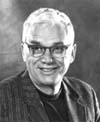
Joseph Doob
Doob earned his bachelor's degree at Harvard University in 1930, one year later earned a master's degree and one year after that defended his doctoral dissertation on boundary values of analytic functions. This amazing record -- a doctorate in only two years! -- turned out to not be such a good thing. Indeed, Doob wrote that he was "woefully ignorant of almost everything in mathematics not directly connected" with his dissertation.
This lack of breadth in mathematics, coupled with the Great Depression, made the prospects for an academic job dismal indeed. However, one area of mathematics that was expanding was statistics and Harold Hotelling at Columbia arranged for Doob to receive a Carnegie Fellowship in this area. The work on this fellowship enabled Doob to obtain a faculty position at the University of Illinois, where he remained for the rest of his career except for a short hiatus during World War II to work on naval mine warfare.
Doob's contributions were primarily in probability theory, including stochastic processes, martingales, optimal stopping, and potential theory. Doob's work remains some of the most powerful tools available to study stochastic processes and his 1953 text is still in print.
Doob was a member of the National Academy of Sciences and the French Academic of Sciences. He was awarded the Steele prize in 1984 and the National Medal of Science in 1979,
Born: 27 Feb 1910 in Cincinnati, Ohio, USA
Died: 7 June 2004 in Clark-Lindsey Village, Urbana, Illinois, USA
The premiere site for biographies of mathematicians on the web is at The University of Saint Andrews in Scotland; this is the primary source of the information in these short biographies. Some biographies used additional web resources as noted in the biography.
The postage stamp images came from a wonderful site on mathematicians on stamps maintained by Jeff Miller, a mathematics teacher in Florida.
The Free Internet Encyclopedia Wikipedia is also an excellent source of information and was used as a reference for many bographies.
The opinions expressed in these biographies are those of the author and do not reflect official views of the University of Oklahoma.
